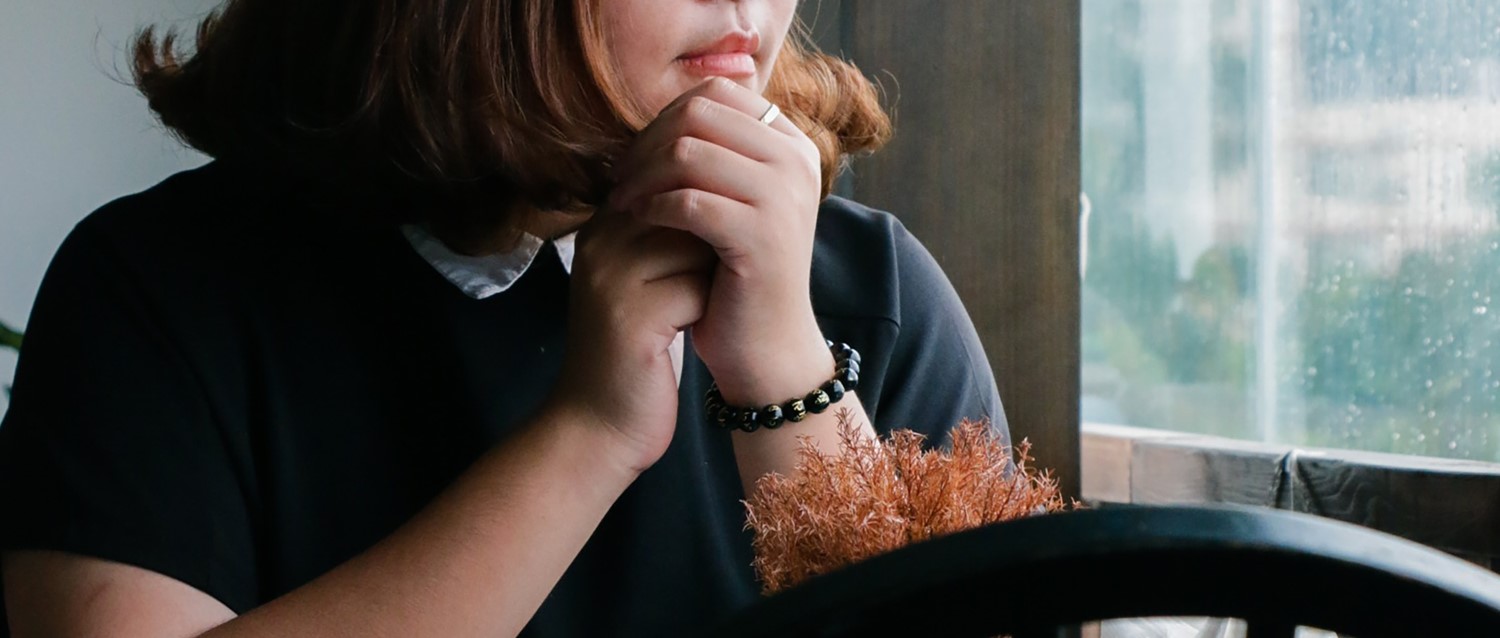
How to manage pregnancy when you have an eating disorder
Peer reviewed by Dr Sarah Jarvis MBE, FRCGPAuthored by Emily Jane BashforthOriginally published 28 Feb 2022
Meets Patient’s editorial guidelines
- DownloadDownload
- Share
- Language
- Discussion
- Audio Version
Pregnancy can present a number of challenges for people with eating disorders. It is a period of great change as a new life is created. Eating disorders in pregnancy can also develop, even if someone hasn't experienced one before. In both instances, it's important to practise self-care and establish a trustworthy support system that can offer advice and help you when triggers arise.
In this article:
Continue reading below
Eating disorders and pregnancy
Dr Rachel Evans is an eating disorder recovery psychologist and she explains how a changing body during pregnancy can be triggering.
"During pregnancy, it's almost guaranteed that your body will change shape and size. However, the amount of weight gained and where you will put on that weight is unknown, which can lead you to feel out of control.
"Additionally, seeing or feeling weight gain can be a trigger for those who fear becoming 'fat'. This situation could be worsened by comments from relatives, friends, colleagues and even strangers about someone's changing body, 'baby weight' or bump size."
While, for some, pregnancy can be a motivator to stop engaging in eating disorder behaviours almost immediately, it isn't always straightforward if an eating disorder is long-standing. The healing process can be tricky when outsiders perceive you as 'better' purely because you are pregnant, forgetting that recovery and rebuilding body image are psychological processes which often have little to do with physical appearance.
Other aspects of pregnancy that could prove challenging for those with eating disorders are:
Changes in appetite during pregnancy
Appetite can fluctuate during pregnancy. Whether it's an increased appetite due to cravings, or decreased appetite due to sickness, it's likely these changes will prove difficult to navigate if you are used to controlling your food intake.
Increased appetite in pregnancy
Dr Evans explains that eating more could cause you to feel guilty if you are used to restricting how much you eat. It may trigger an episode of binge eating if you don't feel satisfied or if you think you have eaten 'too much' and so might as well just keep on eating.
Loss of appetite in pregnancy
Nausea is common during pregnancy. This can make it challenging to eat sufficient calories to sustain yourself and your baby if you don't feel like it. It could also make the voice of an eating disorder louder. If you are in recovery from anorexia, malnourishment may be a trigger that urges you to engage further in restrictive behaviours.
Dr Evans adds that decreased appetite due to nausea could prove massively triggering for those struggling with or in recovery from bulimia who have previously purged by self-induced vomiting.
"Many people experience a change in food preferences as they progress through pregnancy. For example, bland foods like cereal and toast can be more appealing at times than fruit or vegetables. This might be a challenge if you fear eating certain foods that your body is asking for, and they go against the rules of your 'safe foods'," she adds.
It's important to remember throughout pregnancy that turning to compensatory mechanisms (such as self-induced vomiting, excessive laxatives or diuretics, extreme exercise, or fasting) can be very dangerous, both for you and for your unborn baby.
Seeking advice from a variety of sources
When pregnant, it's understandable why people seek advice from blogs, pregnancy books, and loved ones. However, absorbing all this information around healthy eating and controlled weight gain can be overwhelming.
You might interpret it as new 'rules' and expectations to adhere to as you compare yourself to other expectant parents. However, pregnancy is a really personal experience and you don't have to do what everyone else is doing. Have a circle of experts whom you trust to make sure the advice you are getting is what you really need.
Eating disorders and control
"Eating disorders are a coping mechanism and they centre around control," says Dr Evans.
"Hormonal changes during pregnancy can lead you to experience certain emotions such as anxiety or feeling overwhelmed, more intensely. You might then feel compelled to use eating disorder behaviours, such as restricting food or binge eating, to cope."
She stresses the importance of learning new ways to handle unexpected, difficult emotions and situations. This will not only boost your mental health during pregnancy but enable you to maintain it afterwards too.
Can pregnancy cause eating disorders?
Back to contentsPeople can develop an eating disorder in pregnancy, even if they haven't struggled with one before. Eating disorders are complex mental illnesses, and pregnancy is a unique experience for everyone. Therefore, an eating disorder during pregnancy could stem from a variety of situations. But, Dr Evans notes a selection of possible triggers which can make navigating pregnancy, body image and food particularly hard.
Triggers for eating disorders in pregnancy
These can include:
Social media - edited photos of celebrities and influencers with a 'pregnancy glow', filtered bump and no stretch marks can paint an unrealistic, unattainable idea of pregnancy. This is likely to heighten the pressures others feel to have a certain body size, even when they know their body is changing for the right reasons.
Major body changes - it's natural for pregnancy to change how the body looks, but this can cause expectant parents to feel uncomfortable in their own skin. For example, developing stretch marks or gaining weight could lead to behaviours such as restricting and purging.
Pressure to eat 'perfectly' - Dr Evans says there can be added pressure to become the epitome of health during pregnancy, both for you and for your child. This might cause urges to take supplements or exercise more. However, it may develop into orthorexia - which involves restricting food intake based on how 'clean' or healthy specific food is judged to be. Someone might not be aware of the changes in their behaviour or could become defensive when questioned.
Cravings - according to Dr Evans, pregnant women appear to be at increased risk of developing pica. This is an eating disorder that is not related to weight but is a disorder that involves a craving for or consumption of non-food items with little or no nutritional value. These items might be dirt, clay, paper or ice.
This can be a problem if the non-food item is toxic, since it can damage the digestive system. Even if it not directly toxic, the empty calories it contains can take the place of nutrient-dense foods and lead to malnutrition.
Continue reading below
What are the health complications of eating disorders in pregnancy?
Back to contentsEngaging in eating disorder behaviours during pregnancy can lead to severe complications, as noted by the National Eating Disorders Association (NEDA).
Risks for the baby:
Poor development.
Premature birth.
Low birth weight.
Difficulty breathing.
Trouble feeding.
Cardiac irregularities.
Risks for those who are pregnant:
Malnourishment.
Dehydration.
Heart problems.
Diabetes.
Labour complications.
The fear of getting pregnant
Back to contentsMany eating disorder survivors fear pregnancy. In these cases, Dr Evans recommends identifying your triggers and implementing boundaries so people know how to support you.
"If you're aware of your triggers, you can make a plan for how to handle them if they arise. For example, if you're worried about gaining weight, you could have a direct conversation with family members and ask them not to comment on how your body is changing, or plan a fun shopping trip with a friend when you need to buy maternity clothing."
She adds that "there is never a perfect time to start a family", but you should be honest with your healthcare staff (GP, midwife and if appropriate your hospital team) from the beginning. They can offer guidance throughout the process.
Continue reading below
What forms of self-care can you practise during pregnancy?
Back to contentsBreathing techniques for pregnancy
"Breathing exercises direct attention to the present moment. Deep breathing helps to de-activate the sympathetic nervous system (fight, flight, freeze) and activate the parasympathetic nervous system (rest and digest), which makes you feel calmer," shares Dr Evans.
Exercise classes for pregnancy
There are specially designed pregnancy yoga classes that can be a good way to get in touch with your changing body.
"These gentle sessions could help you start to appreciate how your body is supporting you, not working against you, and take the focus away from its changes."
Dr Evans adds that antenatal classes or meet-ups could help you to find other people who relate to what you're going through, make connections and grow a new support network.
Go easy on yourself
Arguably the most important point to remember is that your body is working hard to grow a baby. It's natural to feel more tired, hungry or irritable than usual as you endure such a life-changing process.
"Take off the pressure to do everything and have it done perfectly. Prioritise the tasks that you really need to get done, delegate what you can and cross the less important items off your to-do list. Your body is doing an amazing thing, let it guide you to where it wants to be."
Real life experiences of eating disorders in pregnancy
Back to contentsLena, 24, developed an eating disorder in 2013. She was diagnosed with atypical anorexia in 2020 after several bouts of therapy in the early stages proved unsuccessful.
When planning to get pregnant, Lena was 'really stable' with her eating disorder recovery, but had worries about weight gain. She found out she was expecting in October.
"At first I gained water weight and I was concerned. However, as nausea kicked in and I started losing weight, this was triggering because I wanted to lose more. I was proud that I didn't gain weight until week 14 of my pregnancy."
Now 23 weeks, Lena says it's difficult to handle having zero control over what her body is doing, even though she knows she's creating a baby.
One thing she's found comfort in, though, is speaking with her boyfriend. He has reminded her why her body is changing and encouraged her not to over exercise, but engage in physical activities she enjoys, such as dance workouts.
Lena is nervous about how her body will look after giving birth and the pressures from society to 'bounce back'. But, she is proud of what her body has done.
"My body is growing a little human. It's magical. While it's challenging to let the control of my body changing go, I have evolved and strengthened so much," she says.
"It’s been hard dealing with other people's comments on my appearance. It would be nice to just to hear, 'I am here for you if you want to talk', and to just be reminded that I am doing a great job."
If you suspect an eating disorder, you can contact Beat, the UK's eating disorder charity, 365 days a year on 0808 801 0677 or beateatingdisorders.org.uk. You should also book a GP appointment, as support from perinatal mental health services is available via the NHS.
Patient picks for Eating disorders

Mental health
Eating disorders in athletes: how can we tackle them?
Eating disorders are serious, complicated mental illnesses. They can affect anyone, regardless of age, gender, race, sexuality, background or occupation. However, there is evidence to suggest that athletes are disproportionately affected, with many arguing that eating disorder behaviours are actually encouraged in sport.
by Emily Jane Bashforth

Mental health
What is the difference between disordered eating and an eating disorder?
It can be difficult to differentiate between disordered eating and a full-blown eating disorder (ED). This is especially the case since we live in a diet culture where talk of weight loss, 'clean eating' and fitness is rife. However, it's important we are able to identify a toxic relationship with food and know where to seek help early before things get worse.
by Emily Jane Bashforth
Article history
The information on this page is peer reviewed by qualified clinicians.
28 Feb 2022 | Originally published
Authored by:
Emily Jane BashforthPeer reviewed by
Dr Sarah Jarvis MBE, FRCGP

Ask, share, connect.
Browse discussions, ask questions, and share experiences across hundreds of health topics.

Feeling unwell?
Assess your symptoms online for free
Sign up to the Patient newsletter
Your weekly dose of clear, trustworthy health advice - written to help you feel informed, confident and in control.
By subscribing you accept our Privacy Policy. You can unsubscribe at any time. We never sell your data.